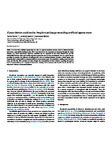If your device could smile: People trust happy-sounding artificial agents more
| dc.contributor.author | Torre, I | |
| dc.contributor.author | Goslin, Jeremy | |
| dc.contributor.author | White, Laurence | |
| dc.date.accessioned | 2020-07-13T15:12:21Z | |
| dc.date.available | 2020-07-13T15:12:21Z | |
| dc.date.issued | 2020-04 | |
| dc.identifier.issn | 0747-5632 | |
| dc.identifier.issn | 1873-7692 | |
| dc.identifier.other | 106215 | |
| dc.identifier.uri | http://hdl.handle.net/10026.1/16010 | |
| dc.description.abstract |
While it is clear that artificial agents that are able to express emotions increase trust in Human–Machine Interaction, most studies looking at this effect concentrated on the expression of emotions through the visual channel, e.g. facial expressions. However, emotions can be expressed in the vocal channel too, yet the relationship between trust and vocally expressive agents has not yet been investigated. We use a game theory paradigm to examine the influence of smiling in the voice on trusting behavior towards a virtual agent, who responds either trustworthily or untrustworthily in an investment game. We found that a smiling voice increases trust, and that this effect persists over time, despite the accumulation of clear evidence regarding the agent's level of trustworthiness in a negotiated interaction. Smiling voices maintain this benefit even in the face of behavioral evidence of untrustworthiness. | |
| dc.format.extent | 106215-106215 | |
| dc.language | en | |
| dc.language.iso | en | |
| dc.publisher | Elsevier BV | |
| dc.subject | Trust | |
| dc.subject | Smiling voice | |
| dc.subject | Virtual agents | |
| dc.title | If your device could smile: People trust happy-sounding artificial agents more | |
| dc.type | journal-article | |
| dc.type | Journal Article | |
| plymouth.author-url | https://www.webofscience.com/api/gateway?GWVersion=2&SrcApp=PARTNER_APP&SrcAuth=LinksAMR&KeyUT=WOS:000510523800021&DestLinkType=FullRecord&DestApp=ALL_WOS&UsrCustomerID=11bb513d99f797142bcfeffcc58ea008 | |
| plymouth.volume | 105 | |
| plymouth.publication-status | Published | |
| plymouth.journal | Computers in Human Behavior | |
| dc.identifier.doi | 10.1016/j.chb.2019.106215 | |
| plymouth.organisational-group | /Plymouth | |
| plymouth.organisational-group | /Plymouth/Faculty of Health | |
| plymouth.organisational-group | /Plymouth/Faculty of Health/School of Psychology | |
| plymouth.organisational-group | /Plymouth/REF 2021 Researchers by UoA | |
| plymouth.organisational-group | /Plymouth/REF 2021 Researchers by UoA/UoA04 Psychology, Psychiatry and Neuroscience | |
| plymouth.organisational-group | /Plymouth/REF 2021 Researchers by UoA/UoA04 Psychology, Psychiatry and Neuroscience/UoA04 Psychology, Psychiatry and Neuroscience MANUAL | |
| plymouth.organisational-group | /Plymouth/REF 2021 Researchers by UoA/UoA04 Psychology, Psychiatry and Neuroscience/UoA04 REF peer reviewers | |
| plymouth.organisational-group | /Plymouth/Research Groups | |
| plymouth.organisational-group | /Plymouth/Research Groups/Centre for Brain, Cognition and Behaviour (CBCB) | |
| plymouth.organisational-group | /Plymouth/Research Groups/Centre for Brain, Cognition and Behaviour (CBCB)/Brain | |
| plymouth.organisational-group | /Plymouth/Users by role | |
| plymouth.organisational-group | /Plymouth/Users by role/Academics | |
| dcterms.dateAccepted | 2019-11-26 | |
| dc.rights.embargodate | 2020-12-8 | |
| dc.identifier.eissn | 1873-7692 | |
| dc.rights.embargoperiod | Not known | |
| rioxxterms.versionofrecord | 10.1016/j.chb.2019.106215 | |
| rioxxterms.licenseref.uri | http://www.rioxx.net/licenses/all-rights-reserved | |
| rioxxterms.licenseref.startdate | 2020-04 | |
| rioxxterms.type | Journal Article/Review |


